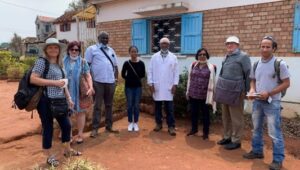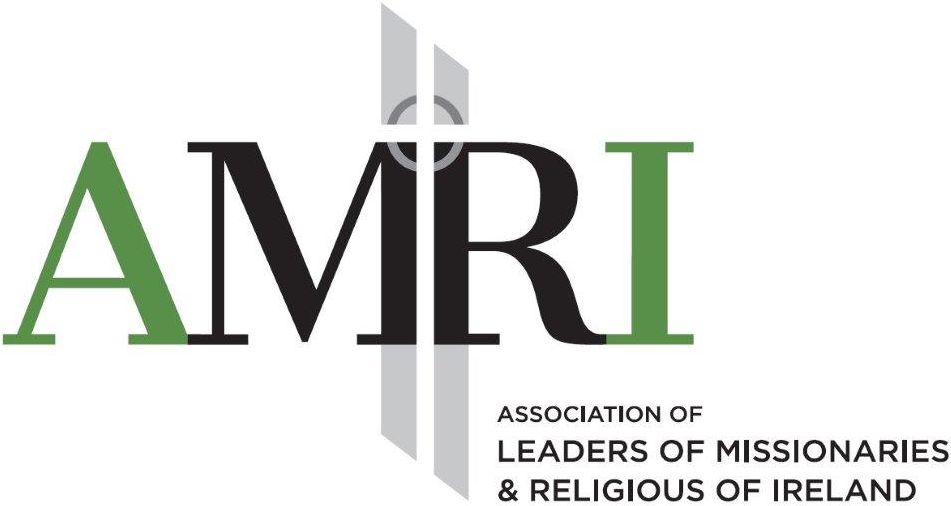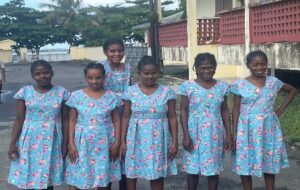UN INTERNATIONAL DAY TO END OBSTETRIC FISTULA
May 23rd is the United Nations International Day to End Obstetric Fistula. This year marks the 20th anniversary since the United Nations Population Fund (UNFPA) launched its Campaign to End Fistula. In 2013, the campaign became a wider internationally observed UN International Day for raising awareness and taking action to end obstetric fistula.
What is Obstetric Fistula?
An obstetric fistula happens when there is a prolonged or obstructed labour, which can lead to an abnormal opening between a woman or girl’s birth canal and her urinary tract or rectum. This physical injury results in urinal and/or faecal incontinence. The UN reports that 90 percent of babies that are born to a woman or girl who develops obstetric fistula, are stillborn. This is undeniably an horrific, debilitating experience for all affected women and girls and yet, it remains a neglected human rights and public health concern. Many women and girls at risk of obstetric fistula reside in remote rural locations, are young, poor, have limited access to education or livelihood options and occupy subordinate positions within their home and community.
What are the some of the issues?
Every year there are an estimated 50 000 to 100 000 new obstetric fistula injuries worldwide, with more than 2 million young women already living with untreated obstetric fistula, principally in Asia and sub-Saharan Africa. This reality is a result of several structural and social inequalities including logistical or geographical challenges in accessing critical medical care; insufficient or inadequate medical facilities for emergency services; not enough skilled personnel to safely monitor labour and provide the necessary medical interventions; poor rural infrastructure; gender inequality and women’s subordinated status within society. The Covid-19 pandemic compounded these realities, as overburdened medical facilities prioritised pandemic patients over obstetrics and fistula repair surgeries, placing yet more women at risk. An additional consequence of the pandemic is the heightened risk of an anticipated 13 million additional child marriages by 2030, as families seek to ‘marry off’ their daughters in order to try to alleviate the anticipated economic consequences of the pandemic.
The global campaign to end obstetric fistula by 2030
Obstetric fistula is preventable. The campaign to end obstetric fistula by 2030 is accelerating as we anticipate meeting our global targets under the Sustainable Development Goals to reduce maternal injury and disability and to ‘leave no-one behind’.

AMRI are supporting Fr Edward Flynn CSSp, in his campaign at the UN in Geneva to prevent obstetric fistula globally. Fr Edward recently visited Madagascar, an island country in the continent of Africa, with representatives of the World Council of Churches and a human rights organisation based in Geneva, Switzerland. The focus of the visit was to gather field data and to explore the realities on the ground for fistula survivors and those at risk of obstetric fistula.
Below is a brief account of this trip.
LEAVING NO-ONE BEHIND: WOMEN, GIRLS, AND OBSTETRIC FISTULA IN MADAGASCAR
by Edward Flynn C.S.Sp
Researching the Realities
In late October 2022, I visited Madagascar along with a social work lecturer from Canada, a human rights trainer from Switzerland, and three representatives from the World Council of Churches (WCC) based in Geneva/New York. We were there to explore the realities of obstetric fistula and to engage on the issue with personnel from several of Madagascar’s many Christian churches, with doctors, surgeons, midwives, NGOs and UN agencies. Madagascar has one of the highest incidences of obstetric fistula in the world due to the combination of poor roads, limited transport, and a healthcare system that many cannot access.
Perfect storm
In rural areas of Madagascar where women live in poverty, as in other countries with a prevalence of obstetric fistula cases, the absence of emergency obstetric care facilities and poor road/transport infrastructure makes for ‘a perfect storm’. In general, medical and surgical standards are low and many women with fistula(e) suffer several surgeries without ever having a positive outcome. Oversight, awareness and increased funding for fistula operations to reduce the suffering endured by women is urgently needed. With a limited repair capacity in Madagascar, the existing backlog of some 50 000 cases in the country is rising annually by over 500 new cases. Added to that is the low level of qualified surgeons to perform the complex operations and the situation becomes desperate. While prevention remains the ultimate goal, there are estimated to be 2000 new cases each year in Madagascar so the problem of obstetric fistula will remain for the foreseeable future.
A group of patients ready to go home after repair surgery
A meeting with Dr Michael Breen, a fistula repair surgeon
We travelled to the second main city of Tamatave where we visited the Fistula Care Centre, a 40-bed unit supported by Freedom from Fistula Foundation headquartered in Scotland. Most of the patients who are treated in the Fistula Care Centre are referred by former, cured patients who encourage them to come for repair surgery.
Whilst there, we met with Dr Michael Breen, a medical doctor from Ireland who treats patients with fistula/e daily. Dr Breen is one of the region’s top experts in surgical fistula repair, having trained at referral centres in Ethiopia, Sudan, and Uganda. He conducts regular surgical missions to Malawi, Angola, Sudan, and Sierra Leone and Zambia. According to Dr Breen the physical irritation of the constant leaking of urine and having to sleep on a wet bed are key concerns for the women and girls. However, what bothers women with fistula most is the smell associated with the leaking. As a result, fistula patients are often mocked and stigmatized by others in their community, being called names such as “Miss Pee-Pee”. Most often the women and girls would generally avoid or be ostracized from any communal activities and forced to watch life from a distance. They fear that their condition will never improve and that life is not worth living. However, once cured, they regain their confidence and look forward to socialising again through activities such as shopping and attending church and community services.
At the Fistula Care Centre, each week a group of patients are ready to go home after having had fistula repair surgery. To mark their ‘new life’, survivors are given a new dress and a small celebration is held. They each give a testimony of their lives with a fistula and their hopes for the future after the repair surgery.
Preventing Obstetric Fistula
At current rates, a hundred years of repair operations would not eliminate the problem. Hence the necessity for a strong prevention policy, strategy and programme. Daily consistent care by many midwives and doctors in rural areas means that assistance is now beginning to reach those most in need of emergency obstetric services. Having visited hospitals and villages in three locations a distance from the capital, what was most striking was the gap between urban and rural conditions which are separated by distance, language and facilities. This gap has to be addressed if the prevention of obstetric fistula is ever to be realised.
A Prayer for the Prevention of Obstetric Fistula
God of Life, Love and Faithfulness
As we reflect on the lives of women living with fistula,
We pray for your protection of them.
Created in your image and likeness, they carry all the
risk, suffering, and pain associated with childbirth.
May we respond with greater urgency to the needs
of all women due to give birth.
We pray that greater emphasis be given to the prevention
of this devastating condition.
May women and girls living with obstetric fistula
be helped and supported with all the professional
skills and services that our societies have to offer.
And as they give birth may their dignity be respected,
We ask this through the help of the One born in a Stable.
Amen.
Understand more:
See the AMRI webinar: Obstetric Fistula – A Human Rights Perspective https://www.youtube.com/watch?v=AfyhBoSkZhw&t=3s
Watch a Gospel reflection “Who touched my cloak?” by Toni Pyke on the experience of obstetric fistula found on the Irish Redemptorists mobile phone app: ‘The Preached Word’. See the video HERE
Read a Gospel reflection by Sean Goan: Unacknowledged Heroes: The Gospels and Obstetric Fistula HERE
Check out the UNFPA interactive website End Fistula campaign: https://endfistula.org/
See the AMRI webinar: Obstetric Fistula – A Human Rights Perspective https://www.youtube.com/watch?v=AfyhBoSkZhw&t=3s



